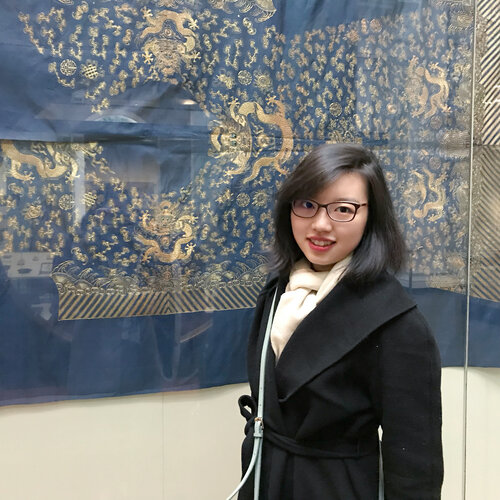Tell us a little bit about yourself...
I am Zoe. I come from Shanghai, China. Studied in the Chinese education system for one year before graduating from senior high school, I decided to learn counselling/psychology and have my further education in the UK. So, I changed my route to A levels and did BSc Psychology at University College London (UCL). I am now at the final stage of my MSc Counselling and Psychotherapy course. What a marathon!
I enjoy travelling and photography. I am also a near-to-professional Latin dancer and a Chinese-English interpreter and translator. Plus, I have been a part-time Mandarin teacher for more than 2 years now.
Why did you choose Strathclyde for your postgraduate degree?
I was searching for a one-year, BACP accredited MSc Counselling and Psychotherapy course. Some options popped up. The reason to choose Strathclyde are as follows:
- Strathclyde Counselling Unit has got a long history, as well as this course. The tutors have great experience in teaching and leading research.
- The course is based on the person-centred experiential approach, which I think is the fundamental approach to any further studies, if necessary.
- A wide range of placement opportunities means I can explore different areas for my future career.
- Glasgow is an exciting city that I would like to explore further.
- Plus, I was awarded the Dean's International Excellence Award for Postgraduate Study.
What initially sparked your interest in Counselling & Psychotherapy?
Learning counselling has always been my dream since I was young. But I did not consider it as a profession until the time I was thinking about my undergraduate major. I decided to go for a more generic course – psychology – first and gave myself time to think about whether I would like to pursue a counselling career. The three-year undergraduate course made me realise I had a passion for counselling. So, I completed the fast-track CPCAB Level 2 Certificate in Counselling Skills and Level 3 Certificate in Counselling Studies course alongside my final year of BSc Psychology course. Those courses are the only ones after where I could see myself change as a person. I knew then that counselling and psychotherapy was for me and an absolutely ideal path to take. It also gave me confidence that I chose the right Masters course.
What advice would you give to someone considering studying your course?
Be mentally prepared. It is a tough course. Although a large amount of the course is practice, practice, practice, there is also a significant amount about theory learning and comprehension. Yet, the intensity lies in not only the academic area, but also personal development. Self-awareness is a necessity for all who participate in the course. There is always more to understand about yourself. Don’t forget about the research side of the course, if you think that is tricky.
Self-care. I got this advice from the beginning of the course. But I am quite a resilient person, and I am rather tolerant about stress. So, I did some more self-care. But my experience let me know that was not enough. I began to realise the importance of self-care when I had a mental breakdown in the middle of the course (which is very unusual for me). I adjusted, but that was not enough. In the end, this whole cycle repeats itself two more times. I cannot stress this point more.
What has it been like to study a course like Counselling and Psychotherapy during the past year?
It was a hard year, but we made it. We started the course expecting to go back to in-person learning in October/ November. But the dates for getting on campus was delayed again and again because of the pandemic. Zoom fatigue has almost always been the topic of discussion. The social side of the course was taken away. It was hard. I really appreciate all the tutors and student representatives who have made tremendous efforts to refine the course in a “Covid-special” way – adding the asynchronous learning to reduce some zoom time; adding the weekly Q&A hour to give space for course-related questions and not eating into teaching hours; updating BACP rules and regulations for the course timely… It is a person-centred course – both for the learning content and for the way it was delivered. Everyone has a say, no matter how loud or quiet. Everyone’s voice is heard, whether it is in the chat or people unmute themselves to speak. In the end, we ended the course with all teaching time online. We did not have the usual experience of the course, but we got a unique learning experience that is unlikely to be replicated.
Can you tell us about your experience on placement?
I completed three placements. It is quite unusual. I have to say I learned a great amount from my placements. The placements I chose were in three different areas: the research clinic, college, and charity. The research clinic taught me about the research side of counselling – in particular, data collection. I am fond of doing that. It also gives me another perspective to understand clients. The college placement allows me to work in a multi-disciplinary team. And the charity placement provided me with a taste of working in the third sector. The learning from my clients and my placements have been invaluable.
Tell us a bit about the additional skills you have gained from this programme...
Time management. I thought I was already quite good at it beforehand. But managing my own caseload, working with my placement leads, sorting out time and energy for assignments, supervision and my dissertation project was more than a usual challenge at the beginning. But I am pleased with myself that I can put everything on my agenda, plus time to rest. There are also a lot of other skills I have gained. But I want to highlight the significant change in me – I am more confident about myself. It is interesting to hear from my peers and tutors in consultations, as well as conversations with friends, that they see me as more confident. And I feel so, too. With the placement recruitment process, finding my supervisor, getting on with the course, and so on, I feel I am capable. This is significant for me, as I used to give credits to others instead of myself.
What do you think of the support available on your programme?
I was so surprised and honoured by the timely support I got from my course tutors. They are amazing people! Whether it's a question about an assignment, course or even your life situation, you can always count on them to be there for support.
What are your ambitions for the future?
A part-time counselling work in the university plus a private practice! I enjoy working with young people, but having a private practice is always my end goal. I like to picture myself sitting on my favourite sofa and listening to my clients in my own practice. Fingers crossed that will happen one day.
I also currently have an offer to be an IAPT CBT high-intensity trainee, which is provided by the NHS and King's College London and a placement will be provided by Kensington and Chelsea Talking Therapies Service.
Any final points, or words of wisdom?
Make mistakes. This is what my course supervisor said to me in my first consultation. At that moment, my hidden pride in myself revealed itself. I realised how pride has kept me from the potential achievements I could have reached. Plus, there is a lot of learning attached. For instance, allow yourself to make mistakes; know the difference between mistakes and failures; know how to grow from mistakes… I know this is the most important lesson I learned this year. I hope it can spark some thoughts for you too.

